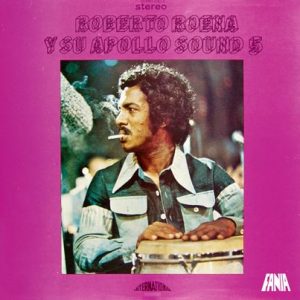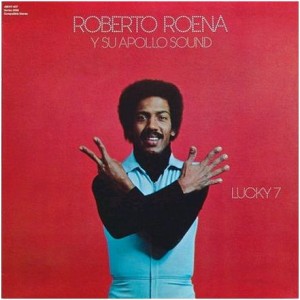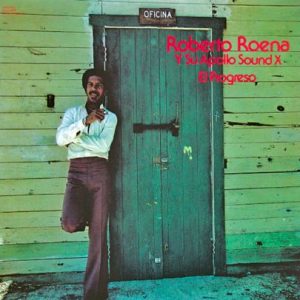This post is also available in:
 Español
Español
In Part 1, I gave you a brief history of the career of Roberto Roena. We covered his early career with Cortijo, El Gran Combo, and the start of his Apollo Sound. Here we’ll cover a bit of his dancing and a lot more about his music.
The ’70s: Apollo Sound Golden Decade
Roberto Roena hit the right note at the right time. When his first album came out in 1969, it opened the door for what would come in the ’70s.
The Apollo Sound launched 9 albums in the decade, with all of them being successful. The successes became bigger and bigger as the decade progressed. Roberto Roena made the right adjustments and selected the right songs for his band. He’d seen the winning formula with Cortijo and El Gran Combo, and executed it impeccably.
The Apollo Sound became one of the best bands in Salsa during the best period of Salsa music. As the fans’ taste for Salsa evolved through the decade, Roberto Roena would stay tuned to make the right adjustments.
The First 4 Apollo Sound Albums
The Apollo Sound of Roberto Roena was a Salsa institution in itself. From his early Apollo Sound albums, “Tu Loco Loco, y Yo Tranquilo” was probably his biggest hit. The song was very catchy and became part of the popular vernacular in Puerto Rico and other places. The hits “El Escapulario” along with the Bobby Capó bolero “Soñando con Puerto Rico” gave the Apollo Sound a great start on their first album (1969).
But for very personal reasons, my favorite from those early days was “Chotorro”, from his 2nd album (1970). I have two sisters, one older, one younger, and me in the middle. I was around 9 or 10 years old when the song came out. My little sister used to be “the informer” and I used to tease her every time “Chotorro” was played on the radio.
However, as a 10-year-old those days, I did not quite get the whole meaning of the song correctly. When it says “…iba yo con mi pollito, en la guagua antes de ayer…” I literally imagined Piro Mantilla (Roberto Roena’s singer) sitting on the bus holding a cage with a chicken inside. And of course, I couldn’t understand what was so bad about someone telling his wife they saw him carrying a chicken on the bus. Was it stolen? What a vivid imagination!
The Roena name has stuck with me since then, but it didn’t resurface in full force until 3 albums later. Perhaps because I was young, I somehow missed “El Traqueteo” from the 3rd album (1971), and “Con Los Pobres Estoy” and “Brisas de Borinquen” from Apollo Sound 4 (1972).

After Roberto Roena resurfaced on my radar with Apollo Sound 5 and 6, I would come back and “discover” what I missed in 3 and 4. I really liked the songs from those albums I mentioned above.
Apollo Sound 5, “Cui Cui”
As I was saying, I re-discovered Roberto Roena with the Apollo Sound 5 hit “Cui Cui” (1973). When I heard the song in the radio, I knew I had to have that LP. By the time I got it, I was already familiar with “Ponte Duro”, from the Fania All-Stars “in the Cheetah” albums. I also liked “Que Se Sepa”, “Avisale a mi Contrario”, and “Aquellos Que Dicen”.
I loved “Cui Cui” because it was a very catchy tune, with a unique chorus. It has a nice arrangement and Sammy Gonzalez singing was at the top of his game.
However, after listening to the whole LP I felt that overall it wasn’t that strong of an album. It was OK. “Ponte Duro” wasn’t a song I listen to a lot, because it was mostly a descarga. In those days, I could appreciate a good descarga, but preferred songs that carry a tune. I also preferred the “Ponte Duro” descarga in the live Fania All-Stars version.
Apollo Sound 6, “Parece Mentira”
The Apollo Sound 6 album (1974) turned the corner for Roberto Roena. This was a much more complete Salsa recording. It had not one or two, but 4 Salsa mega-hits. They start with the old Tito Rodriguez song “El Que se Fue”. It also had “Traicion”, which became a huge hit. From the late Puerto Rican composer Pedro Flores archives, Roberto Roena included “Parece Mentira”. This was another smashing hit. And finally, the album had another descarga song in “Herencia Rumbera”. Here, Endel Dueño’s timbales solo was so amazingly fast, that you wouldn’t get tired of listening to it over and over again.
Eventually, I would learn that Tito Puente didn’t become a legend just by being fast, but also by being rhythmic. That said, Apollo Sound 6 was musically better than its predecessors. To get this sound, Roberto Roena got Elias Lopes to come back to help out Gunda Merced on the arrangements. In addition, Roena also brought Fania raising star Luis “Perico” Ortiz to help in the arrangements.
The result was that 6 of the 9 album songs became hits, which tells you a lot. Sammy Gonzalez and Tito Cruz delivered good soneos. Mario Roman on piano, Endel on timbales, Dario Morales (my next-door neighbor) helping out Mario Alvarez Cora on trumpet, and Miguel Rodriguez on sax & flute, made the Apollo a solid salsa band. Back then, it was hard to imagine Roberto Roena topping this album with his next one. Somehow he figured out how to do it.
The “Lucky 7”, “Mi Desengaño”

The Apollo Sound 7 album was nicknamed “Lucky 7” (1976). It must have been one of the best-selling Salsa albums of the time. It contained “Mi Desengaño”, one of the first “mainstream” Salsa songs of the time. By that, I mean that the song was liked by salseros as well as by non-salsa listeners. I had friends that were pure “rockeros” who loved “Mi Desengaño”.
Overall, the album had about 6 good songs, with 4 or 5 of them become mega-hits. I don’t know how many millions of times I danced the merengue “Mala Maña” in the many “party de marquesina” (party in the garage), which were a common practice in Puerto Rico during the 1970s.
For those of you who didn’t live those days, all I can say is, you have no idea what a good thing you missed! For us in high school during those years, this was pure heaven. But don’t get me started on that. “Lucky 7” was the 1st album in which Ruben Blades wrote a song for Roena “Que Me Castigue Dios”, in which Blades does a humorous spoken cameo at the end of the song.
Could Roberto Roena top the success of “Lucky 7”? He tried very hard with his next 3 albums, but couldn’t do it.
“La Octava Maravilla” had “Rico Guaguanco”
Since nicknaming the Apollo Sound 7 album “Lucky 7” worked so well, Roberto Roena nicknamed Apollo Sound 8 “La Octava Maravilla” (1977). It became an excellent follow-up, containing one of my favorite Roberto Roena salsa songs “Rico Guaguancó”. However, it wasn’t as well rounded in quality as “Lucky 7”.
Rubén Blades gave Roberto Roena another two good salsa songs with “Para Ser Rumbero”, in which he again does a small cameo singing, and “Amistad Barata”. Both became hits, but not mega-hits. These songs, along with “Caminalo y no lo Corras” which I personally didn’t care much for, were the album’s hits. So it was a good try to match or top “Lucky 7”, but no cigar.
Apollo Sound 9 and 10, “El Progreso”

Apollo Sound 9 was a weaker album compared to “La Octava Maravilla”. It had a couple of good salsa songs in “La Distancia” and “Marejada Feliz”, but not much more to back it up. Rubén Blades again contributed with the song “Nadie Sabe”, but I think nobody knew it was in the album.
Apollo Sound X “El Progreso” was actually the best overall album of these last three, as it had several hits although no mega-hit. Roberto Carlos’ title song “El Progreso” was the most played single. Additionally, it also had good songs in “Regaño al Corazón”, “Guaguancó del Adios”, and “Lo Que Dios me Dio” sung by Apollo Sound old faithful Tito Cruz.
“El Progreso” and “Lamento de Concepción” were sung by newcomer Carlos Santos, who came in to substitute Papo Sanchez. I like the album “El Progreso”, although none of its songs were a big “home run”.
Check this video of Roberto Roena’s 25th Anniversary concert. He had great guest artists for the performance of “Lamento de Concepcion”. These include Papo Lucca (piano), Papo Pepin (conga), Elias Lopes (trumpet), Gunda Merced (trombone), Miguel Rodriguez (flute, sax), and Mario Cora (trumpet).
The Fading 80’s
From this point on, the Apollo Sound albums were less and less memorable. Eventually, Roberto Roena got into tax trouble with the government in the mid-’80s which kept him away from music for a while. His return albums “Afuera y Contento” (1985) and “Regreso” (1987) were hardly noticed.
Roberto Roena finally made a decent comeback recruiting his ex-singer Papo Sanchez along with Pupi Cantor to record “El Pueblo Pide Que Toquen” (1994). He then did a reunion concert celebrating 25 years in the Centro de Bellas Artes in Puerto Rico, with all his singers and some guest artists.
Perhaps an appropriate highlight of that concert is this video clip of Gilberto Santa Rosa doing an improvisational homage to Roberto Roena in the middle of “El Que se Fue”.
Summary on Roberto Roena
The Apollo Sound had a distinctive sound, led by Roberto Roena’s aggressive bongo cuts and solid cowbell. Roena also knew how to find the right songs that would resonate with the Salsa public.
The above discography of Roberto Roena, along with his participation as a key member of the Fania All-Stars assured him legendary status among musicians of Salsa. From the boy dancer to a septuagenarian performer, Roberto Roena has written many pages in the history of Latin music.


Lovin your articles…..keep them coming.
Is Roberto Roena still alive
Yes his very alive and still performing with his orchestra ROBERTO ROENA Y SU APOLLO SOUND and FANIA ALL STARS, if you have any questions please don’t hesitate to contact al 1 787 791 7242 or email: [email protected] , [email protected]
Yes his very alive and still performing with his orchestra ROBERTO ROENA Y SU APOLLO SOUND and FANIA ALL STARS, if you have any questions please don’t hesitate to contact al 1 787 791 7242 or email: [email protected] , [email protected]
Your comment is awaiting moderation.
Oh yes. Roberto is still alive and performing with his band and with the Fania “Old” Stars.
Who wrote Mi Desengano ?
From what i found it was Julio “Gunda” Merced y José “Pucho” Souffront
[…] I realize that I may get carried away while writing about my Roberto Roena favorite music. So I’ll make that the focus of Part 2 of this topic on the legend of Roberto Roena. You can get to Part 2 at the link HERE. […]